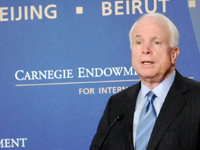Registration
You will receive an email confirming your registration.
Senator John McCain, Republican of Arizona, spoke at the Carnegie Endowment on the importance of a strong U.S.-Indian partnership to address the many challenges faced by both countries and to stabilize South Asia and the international community.
The Rationale for Stronger Relations
The U.S. relationship with India has always been a bipartisan priority, and should remain above the level of partisan bickering, McCain argued. The relationship enjoys broad support because of its strong foundations in shared interests and values.
- Strategic Interests: The United States and India share vital interests in fighting terrorism, balancing a rising China, securing the global energy supply, sustaining economic growth, and strengthening open societies.
- Common Values: The values of human rights, individual liberty, and democratic limits on state power are important foundations for the bilateral relationship, but McCain also suggested that common values of creativity, critical thinking, risk-taking, entrepreneurialism, tolerance, and social mobility ensure that democratic India’s rise as a great power will advance critical U.S. interests.
Unleashing Our Full Potential
McCain said the two nations must resist calls to turn the strategic relationship into a merely transactional one defined by concessions extracted from each other. Senior government officials, McCain asserted, should focus primarily on two areas of cooperation: security and values. Meanwhile, citizens in both countries are leading cooperation on development, agriculture, education, energy, health, and similar issues.
A Sovereign Democratic South Asia
Government leaders must help to shape the development of South Asia as a region of sovereign democratic states, McCain argued. A South Asia full of flourishing democracies would be the greatest guarantor of regional peace and prosperity. He stated that the main threat to this vision is violent Islamist extremism from Afghanistan and Pakistan.
- Counterterrorism: Prime Minister Singh’s restraint after the 2008 Mumbai terrorist attacks was an amazing act of statesmanship, and a clear example of why India is such a valuable partner, McCain said. He argued that the United States should support India’s self-defense through enhanced intelligence sharing and counterterrorism cooperation.
- Afghanistan: Afghanistan has become a major source of tension in the bilateral relationship, as India worries that America might not finish the job. Leaving Afghanistan before the coalition has succeeded in creating sustainable positive conditions on the ground will have terrible consequences for both the United States and India, McCain said. He warned that a premature departure could also deepen India’s reliance on Russia and Iran, further straining U.S.-Indian relations.
- Pakistan: Though cooperation with Pakistan is essential, U.S. strategic interests are not entirely aligned with those of Pakistan or India, McCain said. It is known that individuals in Pakistan’s army and intelligence services support terrorist groups. McCain contended that India and the United States must work with their natural partner, the overwhelming moderate majority of Pakistani society, to help foster a civilian-led, democratic Pakistan at peace with India.
A Preponderance of Power Favoring Freedom
The United States and India must work together to shape a balance of power in the Asia-Pacific region that favors free societies, free markets, free trade, and free commons, McCain said.
- A Region of Democracies: McCain noted that the vast majority of Asia’s 3 billion people live under governments of their own choosing, auguring well for the future of Asia.
- Growing Defense Cooperation: India already conducts more military exercises with the United States than with any other country and is deepening defensive ties with other free nations in Asia. Although the decision about whether to cooperate with the United States will always rest with India’s leaders, McCain suggested that greater military interoperability creates more opportunities for such cooperation.
- China: While the United States and India both seek positive relationships with China, many of Beijing’s recent decisions have been troubling, McCain said. Chinese weapons are being delivered in bulk to territories that border India and Chinese deepwater ports could be suitable for military purposes. Furthermore, McCain noted, China has settled all of its land-border disputes with its neighbors except those with India. A robust U.S.-India partnership can help address these problems and encourage a peaceful rise for China.
A Liberal International Order
Finally, McCain argued, India must be represented in important global institutions to help the United States preserve and protect the international system.
- Membership: The United States should support India’s inclusion in key international forums, most importantly by supporting India’s permanent membership in an expanded United Nations Security Council.
- Democratic Governance: India can also help foster democratic norms by developing national institutions to promote democracy worldwide.
McCain emphasized the importance of the relationship going forward, predicting that “if the twenty-first century is defined more by peace than war, more by prosperity than misery, and more by freedom than tyranny … future historians will look back and point to the fact that a strategic partnership was consummated between the world’s two preeminent democratic powers, India and the United States.”
